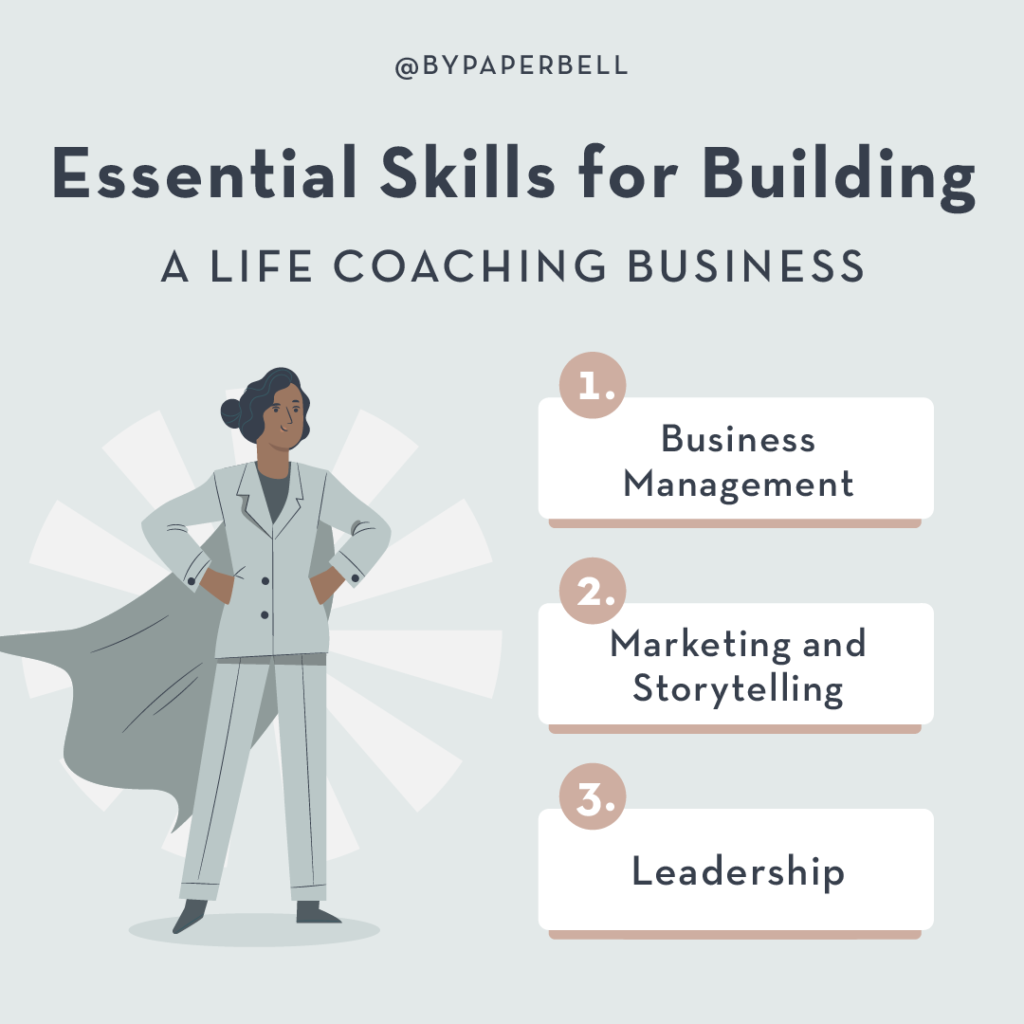Life coaching may look easy when you see fabulous influencers share wisdom posts on Instagram, but on the inside, it’s a little (a lot…) more than just an inspiring feed. Like any other profession, life coaching has its own core competencies and foundational methodologies.
There are many ways someone can become a life coach, with or without a certification. But can anyone become a life coach?
Well, yes and no. You don’t have to be licensed to start a coaching business, but every coach needs some essential skills in their practice. Some coaches acquire these skills from coaching training, and others from their previous careers and life experiences.
The good news is that all of these skills CAN be developed. In fact, professional coaches work on mastering these skills throughout their life. So, don’t feel like you need to look for another career if you fall short on some of these coaching skills.
Whether you’re new to this or actively working with clients, you should focus on these areas to grow as a life coach.
Essential Life Coaching Skills to Use in Your Sessions

Clear and Effective Communication
There’s a reason why this skill comes in number one. Life coaches need to express themselves clearly and articulately so that they can provide perspective for their clients. You need effective communication skills to explain coaching models and exercises and an adequate vocabulary around psychology to help clients reflect on their experiences.
Active Listening
The main difference between listening and active listening is that if you listen actively, you’ll notice things that aren’t necessarily being said explicitly. This means you’ll pick up nonverbal signals and body language cues that can either support, contradict, or add to the meaning of an accompanying statement. Your client may fool themselves sometimes, but if you’re listening actively, they will never fool you.
Reflecting
When you’re reflecting, you’re literally repeating your client’s words back to them. It might seem like stating the obvious, but you’d be surprised how often they don’t agree with their statements once they hear it from someone else.
For example, when they say, “she always disrespects me,” you can simply reflect it as, “so you’re saying she always disrespects you.” This will allow them to question what they’ve just said (maybe she doesn’t always do that) or elaborate on it more.
Paraphrasing
Paraphrasing is another way of repeating back what your client said back to them but in your own words. For example, if they say their boss is annoying, you can say, “so what I’m hearing is that you feel upset about the criticism your boss has been giving you.” When paraphrasing, be careful not to make assumptions about the person or the situation but simply state the facts from a neutral point of view.
💡Pro Tip: Want to keep track of key moments from your coaching conversations without scrambling to take notes? Paperbell makes it easy to add session notes during or after your calls, so you can stay fully present with your client while still capturing those important paraphrasing moments.
Summarizing
After your client has shared a lot with you (possibly jumping between multiple topics), it’s worth summarizing what they’ve just said to you. This simple yet highly effective tool helps your client hear back what they’ve just said from someone else. This way they can face their own thoughts and make any corrections or further reflections on them.
Clarifying
Clarifying is another important skill in your toolbelt as a life coach. It helps remove any ambiguity from your client’s statements and makes sure that you understand what they actually mean instead of your own interpretation.
For example, if they say: “I’ve been all around the place at work” you may clarify by asking “so you’re saying that you’ve been unfocused in your job, is that correct?” Feel free to clarify what they share with you multiple times, if needed, in order to be on the same page with your client.
Encouragement
A life coaching session is a highly vulnerable situation, and personal change isn’t easy. You might see your client’s progress over time, but they may not be as aware of how they’re doing. A little encouragement goes a long way!
Encourage them for every action they take forward, despite fear, and every milestone they reach. You can tell them, “I know that saying this out loud probably hasn’t been easy for you, and I’d like to applaud you for your courage. You’ve been doing such excellent work in our sessions!” You wish you heard that more often, don’t you?
Body Language
Being aware of your body language and consciously using it helps your clients know that you are listening and that they can trust you with sensitive information. Keep eye contact, affirm them with an occasional nod, and keep your arms uncrossed.
Turning your chair at a 45-degree angle or slightly away from facing your client usually works best in coaching sessions. This way, you don’t seem too confrontational, and you can keep your body language open toward them.
Mirroring
Mirroring is another great tool for establishing rapport with your client. You can do this by matching your body language to theirs, for example, crossing the same leg as they do or placing your hands in a similar position. You don’t have to make this too forced (don’t let them notice and be creeped out, please!), but subtle gestures like this are a great way to establish trust.
You can also mirror the language your clients use. For example, if they say they feel like they are in a whirlwind, you can use the same term to refer back to the feeling later on. This way, you’ll speak their language, and they will be more likely to respond well to your questions.
Emotional Awareness
As a coach, you don’t only need to be aware of your client’s emotions but of your own as well. Emotional awareness will help you stay neutral and help you refrain from judgment in coaching conversations, which is pretty much the most important virtue of a coaching professional.
We’re not robots. Sometimes, you might inevitably have an opinion about your client’s situation, or some feelings bubble up in you towards the stories they share. The point is not to not feel them but to simply be aware of them and put them away in your mental drawer, to keep them out of the way of your client’s evolution.
Using Coaching Questions
Oh, that’s a big one! Coaching questions for a life coach are like the powers of a superhero. Asking powerful questions (and timing them right) can break generational patterns, create breakthrough moments, and bring key insights to the coachee.
These questions are usually open-ended, bypassing mental obstacles and putting your client’s challenges into a new context. Since every client is different, you can try rephrasing your questions based on what resonates best with them and using follow-up questions to dig deeper into their answers.
[ Read: 53 Powerful Life Coaching Questions That Work With Every Client ]
Assertiveness
Every coach has a different coaching style, but at some point, you have to challenge your client in order for them to grow — and you won’t be able to do that by coddling them. Transformation requires the courage to face ourselves, so walking on eggshells around your client will actually hold them back from moving ahead. Being assertive will allow you to challenge and encourage your clients at the same time and place the responsibility of their future into their own hands. There’s nothing more empowering than that.
Essential Skills for Building a Life Coaching Business

Time Management
Every entrepreneur and service provider needs to be efficient in managing their time. You’ll have to be fully present in your sessions while also working on your business, which requires being a pro at structuring your schedule. You will also need to maintain the flow of your coaching sessions and reach the closing of the conversation (even after a deeply emotional share) by the time the clock runs out, without leaving your client in a confused or vulnerable state.
[ Read: Why Is Time Management Important? The Top 5 Danger Signs You’re Wasting Time ]
Business Management
Apart from in-house coaches, pretty much all coaching professionals are entrepreneurs. That means you must take care of your accounting and taxes, learn how to create a business strategy, and become a great project manager. You also need to amp up your outsourcing skills, because doing everything by yourself will limit your growth. Of course we believe a Paperbell account to run your coaching business is the best place to start!
Marketing
If you’re a coach, you need clients. You can decide to hire someone to do your marketing (which would be wise) but even so, you need to understand the overview of your own marketing strategy. The key elements of promoting a coaching business are: website management, social media management, collaborations and partnerships, email list management, and even business text apps (for appointment reminders, webinar reminders, or general marketing purposes).
[ Read: The Overwhelmed Life Coach’s Guide to Marketing ]
Storytelling
Storytelling is used in your sessions as a coaching tool as well as in your marketing strategy. Using stories while coaching helps your clients shift into right brain thinking, where their imagination and creativity come to play. It also lets them reflect better on their situation by stepping out of the same old story they’ve been telling themselves.
When you use storytelling in your marketing, you can share more about your personal life and the lessons you’ve learned that made you a better coach. You can also share client stories (anonymously or with consent, of course) as social proof for your services.
Leadership
Every coach is a leader. To be efficient, you’ll need to wear different hats when you’re coaching and when you’re managing the people who help build your business. The key to that is to find your own leadership and coaching style that’s authentic to you and best fits the needs of your clients (and team members).
[ Read: Are You Using All 5 Of These Coaching Styles In Your Practice? ]
Do You Need to Be Certified or Licensed to Be a Life Coach?
No, you don’t have to be certified or licensed to start a coaching business. A certification program will give you comprehensive training and much support from your mentors in order to learn essential coaching skills and methodologies. However, you can also pick up this knowledge and experience by taking courses and working with a mentor on your own. It’s not the paper that matters but how well you can apply coaching in practice, in order to serve your clients.
[ Read: The Best Life Coaching Programs That Will Have You Certified In 12 Months Or Less ]










